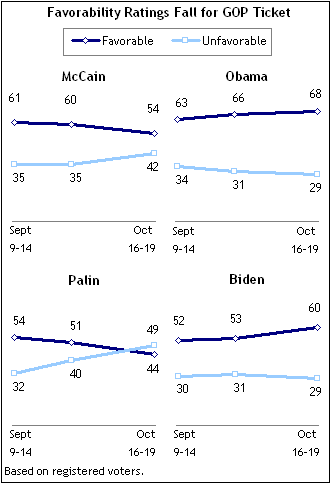 The favorability ratings for both candidates on the GOP ticket have declined over the past month. By contrast, both Barack Obama and Joe Biden are now viewed more favorably than they were in mid-September.
The favorability ratings for both candidates on the GOP ticket have declined over the past month. By contrast, both Barack Obama and Joe Biden are now viewed more favorably than they were in mid-September.
Currently, 54% of voters say they have a favorable opinion of McCain, while 42% have an unfavorable opinion. In mid-September (Sept. 9-14), shortly after the Republican convention, favorable opinions of McCain outnumbered unfavorable views by a wide 61% to 35% margin. McCain’s image has slipped across most voter groups. But the decline among white evangelical Protestants has been particularly notable; currently 71% of white evangelical voters say they have a positive impression of McCain, down from 83% in mid-September.
Over this period, the balance of voter opinion regarding Sarah Palin has moved from positive to negative. In the current survey, 49% of voters express an unfavorable opinion of the Alaska governor, while 44% express a positive opinion; in mid-September, 54% viewed Palin favorably, compared with 32% who had an unfavorable opinion.
Obama’s personal image, already quite positive, is even more favorable than it was in mid-September; currently 68% of voters feel favorably toward Obama, up from 63% about a month ago. Positive opinions of Biden also have increased – from 52% to 60% – since mid-September.
Unfavorable Views of Palin
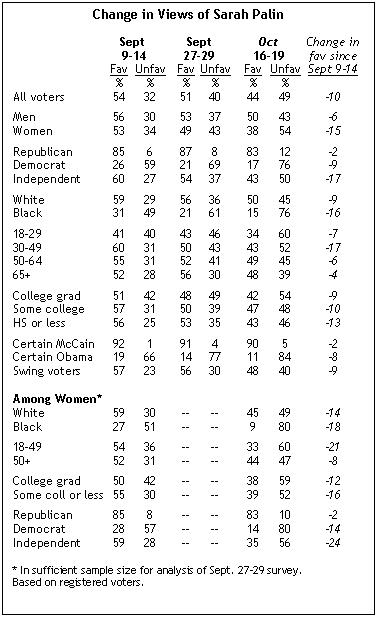 Palin’s image has declined sharply among women voters since mid-September and there is a growing gap in how men and women view the Alaska governor.
Palin’s image has declined sharply among women voters since mid-September and there is a growing gap in how men and women view the Alaska governor.
In the Sept. 9-14 survey, about as many women (53%) as men (56%) expressed positive opinions of Palin. In the current survey, far fewer women (38%) than men (50%) have a favorable impression of Palin.
Independent women, in particular, have an increasingly negative impression of the GOP vice presidential candidate. In mid-September, 59% of independent women expressed a favorable opinion of Palin, compared with 28% who felt unfavorably. Currently, a majority of independent women voters (56%) have a negative opinion of Palin, while just 35% express a positive view.
Views of Palin among Democrats and independents overall have become much more negative since last month. Nearly half (49%) of Democrats now have a very unfavorable impression of her, up from 33% in September. Similarly, 27% of independents now have a very unfavorable view of the Alaska governor, nearly triple the 10% who felt this way in mid-September. However, Palin remains very popular among the GOP base. More than eight-in-ten Republican voters (83%) – including virtually identical percentages of men (82%) and women (83%) – express positive opinions of Palin, which is largely unchanged from the mid-September survey.
Candidate Traits
The presidential candidate’s personal images have not changed markedly over the course of the past month. John McCain is still seen as the more patriotic and qualified candidate, while Barack Obama is viewed more often as inspiring and down-to-earth. But Obama strengthened his image substantially – particularly among independent voters – in terms of being seen as down-to-earth and well qualified. McCain’s image, meanwhile, suffered a bit, as the number describing him as inspiring fell and the number of independents who see him as risky rose.
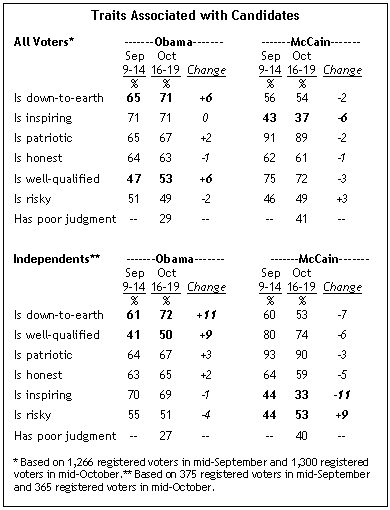 Most voters continue to view McCain as patriotic (89%), well-qualified (72%) and honest (61%), and just more than half (54%) see him as down-to-earth. The share of voters who describe McCain as inspiring has fallen from 43% a month ago to 37% today. Meanwhile, almost half (49%) consider McCain to be risky – up slightly from 46% a month ago and now the same as the proportion that see Obama as risky. More than four-in-ten (41%) say the Republican nominee has poor judgment, notably higher than the proportion that says the same about Obama (29%).
Most voters continue to view McCain as patriotic (89%), well-qualified (72%) and honest (61%), and just more than half (54%) see him as down-to-earth. The share of voters who describe McCain as inspiring has fallen from 43% a month ago to 37% today. Meanwhile, almost half (49%) consider McCain to be risky – up slightly from 46% a month ago and now the same as the proportion that see Obama as risky. More than four-in-ten (41%) say the Republican nominee has poor judgment, notably higher than the proportion that says the same about Obama (29%).
Obama continues to be described as inspiring by seven-in-ten voters (71%) and the share who say he is down-to-earth rose from 65% a month ago to 71% now. More people now say he is well-qualified (53%) than said so in mid-September (47%), though he still trails McCain by 19 points on this measure.
While two-thirds (67%) say that Obama is patriotic, roughly a quarter (26%) say he is not. Still, views of Obama’s patriotism have improved slightly – last April, 61% said they thought of him as patriotic while 32% said he was not. A slim majority of Republicans (51%) and McCain supporters (52%) say they think Obama is not patriotic.
In most cases, the patterns of change over the past month are most notable among independent voters. The perception that Obama is well qualified and down-to-earth has increased substantially among independents, as has the perception that McCain is risky. Today, about the same number of independents describe McCain and Obama as risky (53% and 51%, respectively.) In September, 55% of independents described Obama as risky while just 44% said this about McCain.
Candidate Ideology
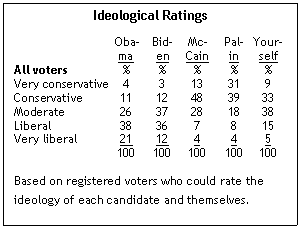 Ideological ratings of the presidential candidates have changed little from earlier this year, with majorities of voters continuing to describe McCain as conservative and Obama as liberal. Roughly six-in-ten voters (61%) who are able to rate McCain’s ideology describe him as conservative, up slightly from 56% in April. Obama is seen as liberal by 59% of voters, down slightly from 63% in April. A somewhat larger number view Obama as very liberal (21%) than describe McCain as very conservative (13%).
Ideological ratings of the presidential candidates have changed little from earlier this year, with majorities of voters continuing to describe McCain as conservative and Obama as liberal. Roughly six-in-ten voters (61%) who are able to rate McCain’s ideology describe him as conservative, up slightly from 56% in April. Obama is seen as liberal by 59% of voters, down slightly from 63% in April. A somewhat larger number view Obama as very liberal (21%) than describe McCain as very conservative (13%).
Roughly equal numbers of voters see the candidates as moderate; 28% say this describes McCain and 26% say the same about Obama. In contrast, nearly a third of voters (31%) described McCain as moderate in April whereas only 23% viewed Obama this way.
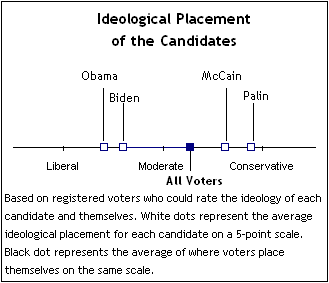 On average, voters rate McCain’s and Obama’s ideology roughly equal distances from moderate. When voters are asked about their own ideology, twice as many describe themselves as conservative than liberal (41% vs. 20%), while 38% say they are moderate. Thus, the ideological rating of a typical voter is closer to McCain’s than to Obama’s.
On average, voters rate McCain’s and Obama’s ideology roughly equal distances from moderate. When voters are asked about their own ideology, twice as many describe themselves as conservative than liberal (41% vs. 20%), while 38% say they are moderate. Thus, the ideological rating of a typical voter is closer to McCain’s than to Obama’s.
Palin is viewed by voters as more conservative than McCain. Seven-in-ten voters see her as conservative, and nearly a third say
she is very conservative (31%). In contrast, Joe Biden is viewed as more moderate than Obama. Fully 37% of voters describe Biden as moderate. Nearly half (48%) say he is liberal, while only 12% say he is very liberal.
Ideology and Vote Preference
 McCain’s electoral base – those voters who support him and say there is no chance they will change their mind – rate McCain as more moderate than they do themselves and Palin as slightly more conservative. While 71% of these committed McCain voters describe themselves as conservative, just over half (56%) see McCain as conservative. Vice presidential nominee Sarah Palin comes closer to these voters’ own positions – 79% rate her as ideologically conservative.
McCain’s electoral base – those voters who support him and say there is no chance they will change their mind – rate McCain as more moderate than they do themselves and Palin as slightly more conservative. While 71% of these committed McCain voters describe themselves as conservative, just over half (56%) see McCain as conservative. Vice presidential nominee Sarah Palin comes closer to these voters’ own positions – 79% rate her as ideologically conservative.
In contrast, Obama and Biden are viewed as far more liberal by committed McCain voters than by voters overall; 85% of McCain supporters describe Obama as liberal and 73% say the same about Biden.
Voters who are certain they will vote for Obama rate their own ideology virtually the same as Obama’s and Biden’s. Among committed Obama voters, 37% describe themselves as liberal and 40% say they are moderate. Similarly, 41% describe Obama as liberal and 36% as moderate. Nearly half (49%) describe Biden’s ideology as moderate and a third (33%) says he is liberal. These committed Obama voters rate McCain and Palin’s ideology about the same as the overall voter average.
Like voters overall, majorities of swing voters describe Obama as liberal (54%) and McCain as conservative (58%). Looking at the average ideological ratings given by swing voters, Barack Obama is seen as about as far to the left as John McCain is to the right. Swing voters, like voters overall, more often rate themselves as conservative than liberal.
Race and the Vote 
Overall, 21% of voters say they personally know anyone who will not vote for Obama because he is black. Far more Obama supporters than McCain supporters say they personally know someone who will not vote for Obama because he is black (27% vs. 10%). More Democrats (29%) and independents (24%) than Republicans (10%) say they know someone who will not vote for Obama because of his race.
There is no difference by race, with roughly equal numbers of white (21%) and black (22%) respondents saying they know someone like this. In addition, there are no substantial gender or age differences in these views among whites and all voters. College graduates are more likely than those with less education to say they know someone who will not support Obama because he is black (26% vs. 18%).
Obama’s Religious Beliefs
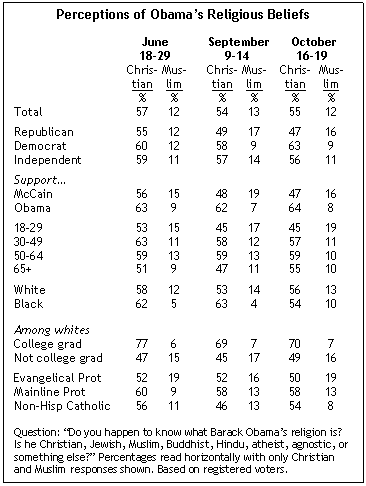 When asked about Obama’s religious beliefs, a small but consistent minority of voters (12%) continue to say that Obama is a Muslim. This percentage has changed little since last month (13%) and is the same as in June.
When asked about Obama’s religious beliefs, a small but consistent minority of voters (12%) continue to say that Obama is a Muslim. This percentage has changed little since last month (13%) and is the same as in June.
Overall, 55% of voters correctly identify Obama as a Christian, while 15% say they do not know because they have not heard enough about his religion. Another 14% are unsure because they have heard different things about Obama’s religious beliefs.
Twice as many McCain supporters as Obama supporters say the Illinois senator is a Muslim (16% vs. 8%). This pattern has remained consistent since March. About one-in-five voters under age 30 (19%) identify Obama as a Muslim, the largest percentage in any age group.
Among white voters, 16% of those who have not completed college say they think Obama is a Muslim and 49% say he is a Christian. By comparison, just 7% of white college graduates say Obama is a Muslim and 70% say he is a Christian.
Nearly one-in-five white evangelical Protestants (19%) say that Obama is a Muslim. This compares with just 8% of white non-Hispanic Catholics.
Is McCain “Too Old”?
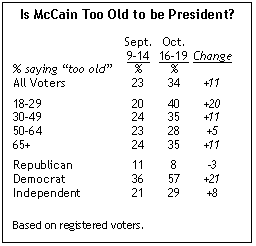 The share of voters who say they think John McCain is “too old to be president” has risen 11 points from 23% to 34% over the past month. The change has been most pronounced among Democrats (up 21 points since September) and younger voters (up 20 points). A majority of Democrats (57%) now say McCain is too old, but few Republicans agree (8%). Independents fall in between, with 29% now saying he is too old to be president.
The share of voters who say they think John McCain is “too old to be president” has risen 11 points from 23% to 34% over the past month. The change has been most pronounced among Democrats (up 21 points since September) and younger voters (up 20 points). A majority of Democrats (57%) now say McCain is too old, but few Republicans agree (8%). Independents fall in between, with 29% now saying he is too old to be president.
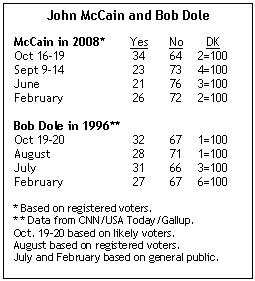 The view that the Republican nominee is too old for the job is now as prevalent as it was when Bob Dole was the GOP candidate in 1996. At a comparable point in that campaign, 32% said they thought Dole was too old to be president. Dole was 73 when he made his run for president; McCain is now 72.
The view that the Republican nominee is too old for the job is now as prevalent as it was when Bob Dole was the GOP candidate in 1996. At a comparable point in that campaign, 32% said they thought Dole was too old to be president. Dole was 73 when he made his run for president; McCain is now 72.


